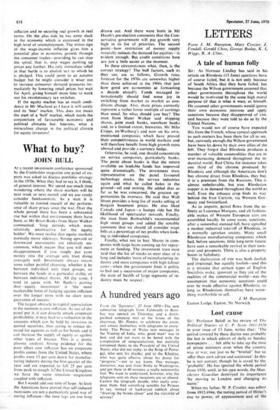What to buy?
JOHN BULL
At a recent investment conference sponsored by the Unitholder magazine one panel of ex- perts was asked to discuss portfolio strategy in the 1970s. What they had to say is, I think, of general interest. We spend too much time wondering where the share markets will be next week or next month and we too rarely consider fundamentals. As a start it is valuable to remind oneself of the perform- ance of share prices since the war. Over the whole period there has been a substantial rise but within that environment there have been, as Mr Brian Banks from Slater Walker commented, 'long periods which were relatively unattractive for the equity holder'. We must realise that equity markets normally move sideways. Strong upward or downward movements are relatively un- common, which means that you will meet disappointment if you simply put your money into the average unit trust doing averagely well. Investment always means some rather painful choosing, whether it be between individual unit trust groups, or between the funds in a particular stable, or between individual shares. All the same, I tend to agree with Mr Banks's parting shot—equity investment is 'the most marketable form of hedging against inflation over the longer term with no short term guarantee of success.*
The largest obstacle to capital appreciation at the moment is cost inflation. As one of the panel put it, it can directly attack corporate profitability, it may lead to a reduction in the amounts which can be held by investors in quoted securities, thus acting to reduce de- mand for equities as well as for bonds and it can increase the supply of equity as against other types of finance. This is a pretty gloomy analysis. Strong evidence for the poor effect cost inflation has on corporate profits comes from the United States, where profits were 13 per cent down for manufac- turing industry during the first quarter of the year and are expected to fall 25 per cent from peak to trough. Indthe United Kingdom we have the same situation—stagnation coupled with inflation.
But I would add one note of hope. At least the Americans have proved that self-induced recessions are not a particularly good way of curing inflation—the time lags are too long drawn out. And there were hints in Mr Heath's pre-election comments that the Con- servative government will put growth very high in its list of priorities. The second point—how restriction of money supply naturally reduces the demand for equities—is evident enough. But credit conditions here are just a little easier at the moment.
In these circumstances what, then, is the correct strategy? The bull factors, such as they are, are as follows. Growth rates forecast for the 1970s are somewhat higher than those achieved in the 1960s (but just how good are economists at forecasting a decade ahead?). Funds managed in- ternationally should find some joy in switching from market to market as con- ditions change. Also, share prices currently represent a rather lower multiple of earnings than usual. So what should you buy? The man from Slater Walker said shipping shares, joint stock banks, merchant banks and, to a limited extent, breweries. Mr Milo Cripps, ex-Warburg's and now on his own, mentioned companies which have proved their competitiveness in world markets and will therefore benefit from high growth rates abroad and provide a currency hedge.
Otherwise, he said, one should concentrate on service companies, particularly banks. The point about banks is that the return available on lendable funds has improved quite dramatically. The investment trust representative on the panel favoured technology stocks, the service industries again and what he called holes in the ground—oil and mining. He• added that as far as he was concerned, the greatest op- portunities lie overseas. He said that Wall Street provides a long list of stocks selling at bargain basement prices. He also liked Canada and Japan—a bumpy ride but the likelihood of spectacular rewards. Finally, the man from Rothschild's recommended high street groups and added the sensible comment that we should all consider wage bills as a percentage of net profits when look- ing at individual companies.
Finally, what not to buy. Shares in com- panies with large loans coming up for repay- ment or funding. The investment trust man said that the list of stocks to steer clear. of is long and includes 'most of manufacturing in- dustry and most companies with high labour costs--when the government finds it politic to bail out a succession of major companies, the state of health of large segments of in- dustry must be suspect'.






























 Previous page
Previous page